Key takeaways:
- Coding competitions enhance problem-solving skills, time management, and resilience through challenging tasks and tight deadlines.
- Collaboration and teamwork provide diverse perspectives, fueling creativity and effective problem-solving.
- Continuous learning from experiences in competitions fosters a mindset of reflection and improvement.
- Applying competition insights to real-world projects demonstrates the value of quick decision-making and iterative learning.
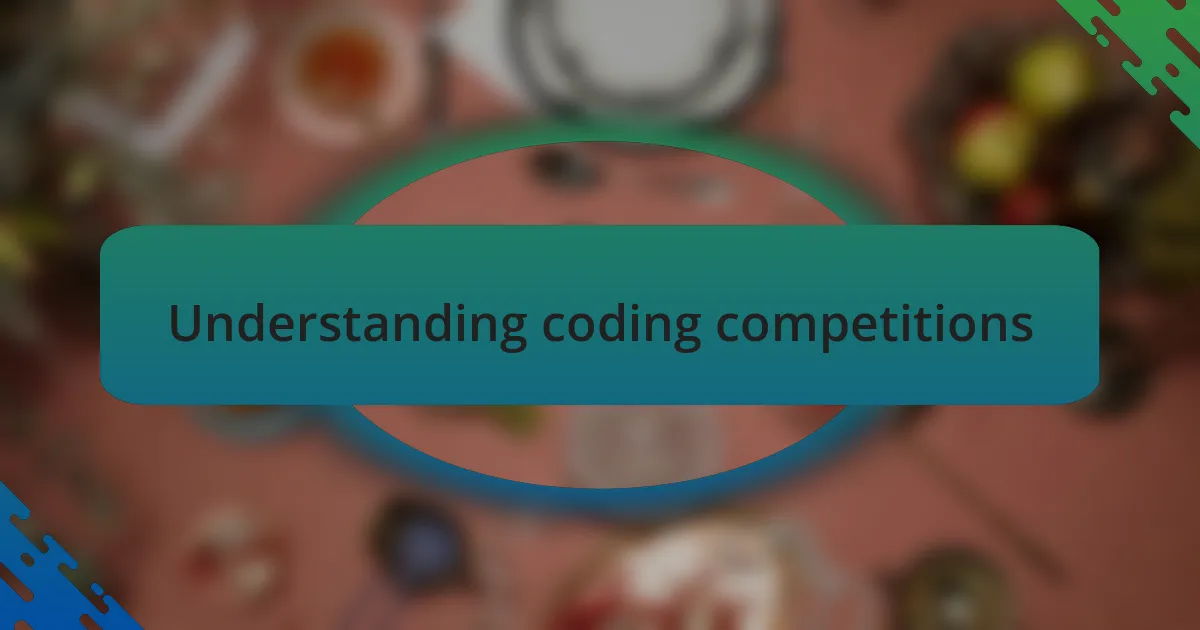
Understanding coding competitions
Coding competitions are dynamic platforms where programmers showcase their skills in problem-solving and algorithmic thinking. I remember my first online contest; the thrill of facing a clock while racing against other coders filled me with excitement and anxiety all at once. Could I really find solutions within tight time constraints?
In these contests, the challenges often vary in difficulty, pushing participants to think creatively and efficiently. I recall struggling with a particularly tricky problem involving graphs. The moment I finally grasped the solution was exhilarating, like a light bulb going off. It taught me that failure is just a step on the journey to mastering complex concepts.
What makes coding competitions unique is the community that emerges from them. I’ve met brilliant minds, exchanged tips, and even collaborated on solutions in real-time. Isn’t it fascinating how a shared passion can lead to friendships and a deeper understanding of technology? The collective drive to improve not only enhances individual skills but also fosters a spirit of camaraderie among participants.
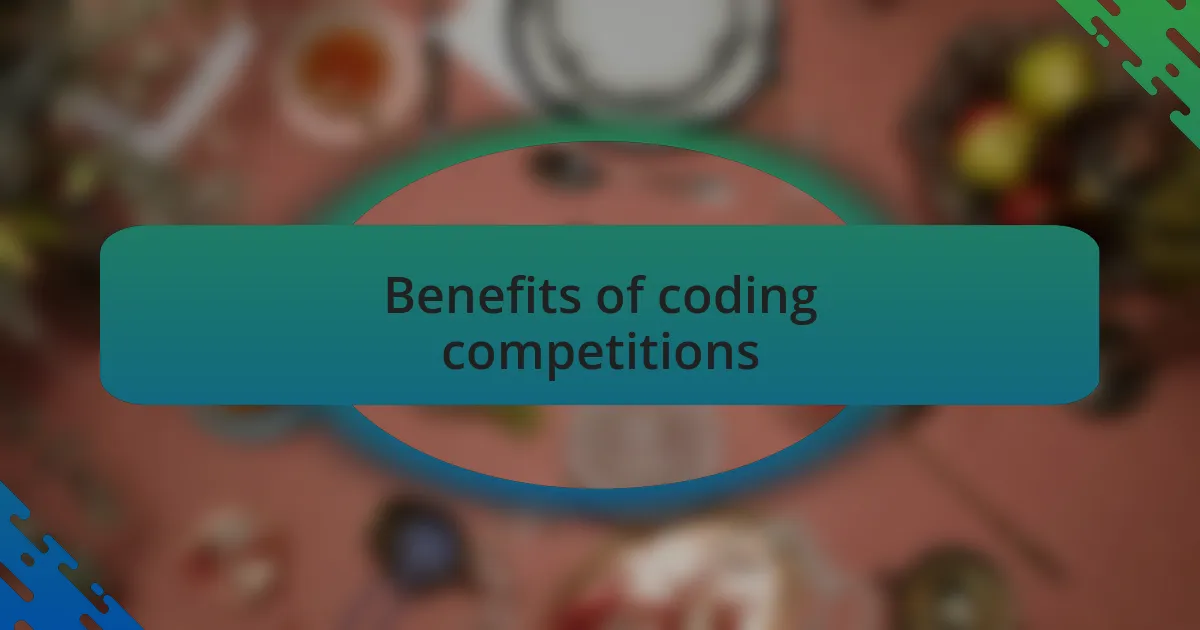
Benefits of coding competitions
Participating in coding competitions has dramatically sharpened my problem-solving skills. I still remember a specific challenge that required optimizing an algorithm under strict time limits. The pressure was intense, but the experience honed my ability to think on my feet and break down complex problems into manageable parts. It’s incredible how these competitions can transform anxiety into a powerful tool for creativity.
Another benefit I’ve experienced is the exposure to diverse programming languages and techniques. There was a coding competition where I encountered a language I had never used before, and that pushed me to learn and adapt quickly. The realization that I could successfully solve problems using unfamiliar tools was a huge confidence booster. Have you ever had a similar breakthrough? I found that every contest stretched my capabilities further and opened my eyes to new possibilities in coding.
Moreover, the competitive nature of these events fosters a continuous learning mindset. Every challenge brings the chance to analyze my performance afterward, identifying mistakes to avoid in the future. Reflecting on my experiences, I see that coding competitions not only teach technical skills but also instill a sense of resilience. It’s this blend of challenge and reflection that keeps me coming back for more, eager to see how much further I can push myself.
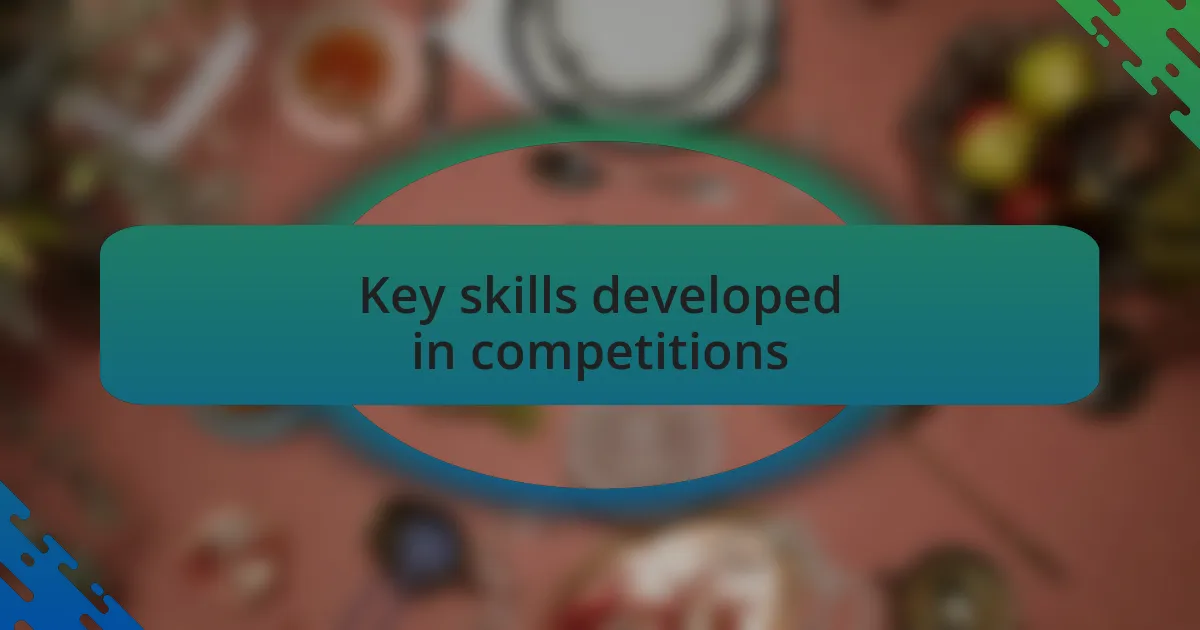
Key skills developed in competitions
One of the paramount skills I’ve developed through coding competitions is effective time management. I recall a competition where I had to solve five problems within a tight two-hour window. Balancing speed and accuracy was a challenge, but I learned to prioritize tasks, tackling the easier problems first to secure points before diving into the more complex ones. Have you ever felt the rush of making those split-second decisions?
Additionally, collaboration has become an unexpected treasure from these competitions. I remember one team event where we had to brainstorm solutions together. Each team member brought a unique perspective to the table, and that diversity led to a richer problem-solving process. It reinforced the idea that two (or more) heads are indeed better than one. How have your teamwork experiences shaped your coding journey?
Lastly, coding competitions have sharpened my algorithmic thinking. There was a situation during a hackathon where I was stumped on a particularly tricky sorting algorithm. My mentor suggested a different approach that transformed my understanding of data structures. This moment was eye-opening—realizing that there are often multiple ways to tackle a problem expanded my toolkit immensely. Don’t you find it fascinating how a single insight can completely change your approach?
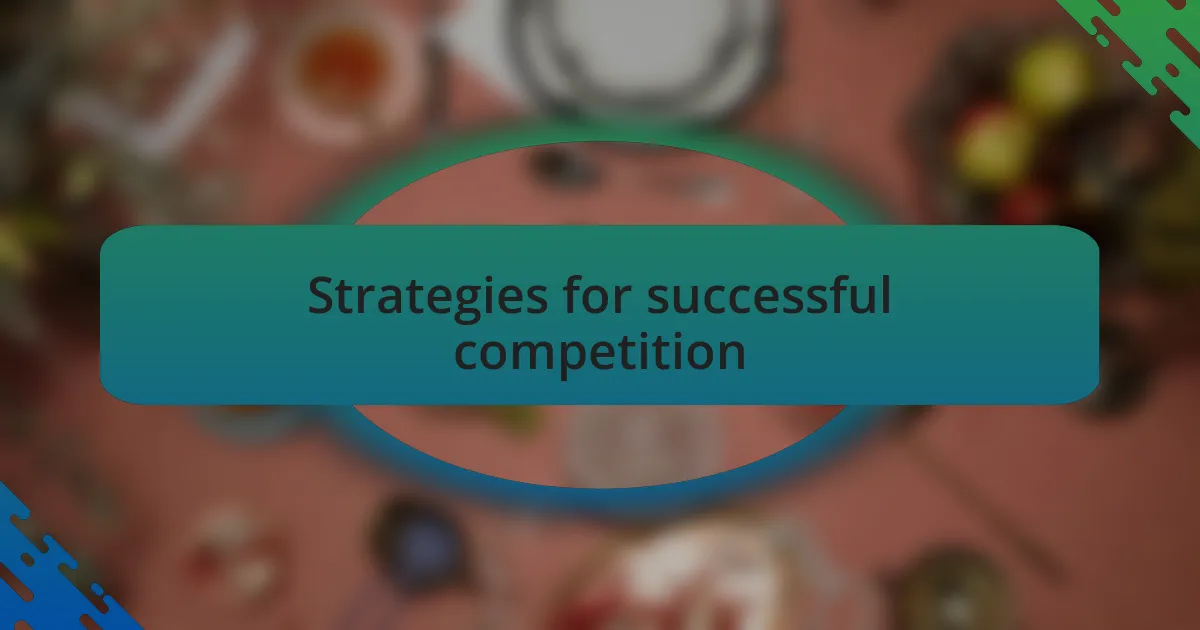
Strategies for successful competition
When it comes to strategies for successful competition, one vital approach is to maintain a focused mindset under pressure. I remember participating in a high-stakes competition where distractions were everywhere—loud noises from nearby competitors and anxiety creeping in. The moment I closed my eyes and focused on breathing, everything became clearer. I realized that mental clarity directly impacts performance. Have you taken a moment to center yourself amidst chaos?
Another key strategy is to familiarize yourself with a variety of problem types before entering a competition. In one contest, I faced a challenging geometry problem that I hadn’t practiced much. If I had dedicated a week leading up to the event to weak areas, perhaps I could have saved precious seconds. It’s funny how a little preparation can make such a big difference. How often do we underestimate the power of practice in unknown territories?
Lastly, keeping an eye on the competition’s leaderboard can be surprisingly helpful. In one instance, I noticed a competitor racing ahead and felt an adrenaline rush. It pushed me to optimize my solutions, resulting in an unexpected burst of productivity. Sometimes, a little friendly competition can spark innovation in ways you wouldn’t expect. Have you ever found yourself inspired by others during a competitive moment?
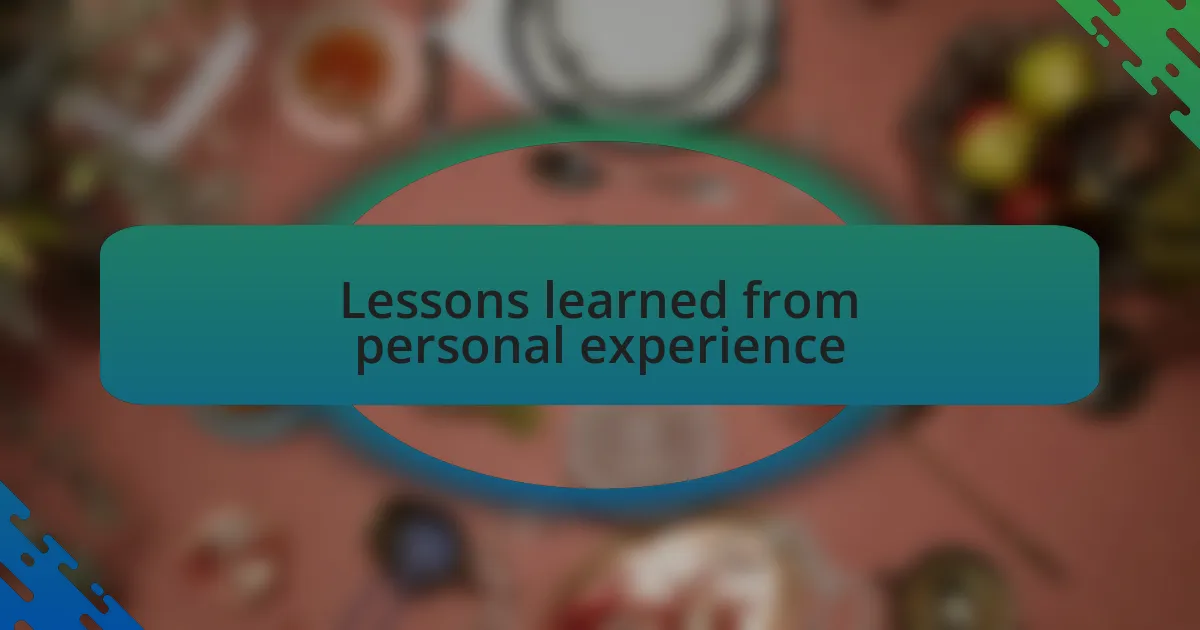
Lessons learned from personal experience
Facing challenges in coding competitions taught me the importance of time management. I once found myself stuck on a single problem for far too long, watching the clock tick away. This experience hit me hard; it was like a light bulb turned on. Now, I prioritize my time better, ensuring that I allocate specific intervals for each problem. Isn’t it fascinating how a single experience can redefine your approach to future challenges?
Another lesson I learned is about the value of teamwork, even in individual competitions. During one particular event, I reached out to a fellow competitor for a quick discussion on a complex algorithm. That exchange sparked my creativity, allowing me to develop a solution I hadn’t considered before. Who would have thought that collaborating, even briefly, could unlock new perspectives?
I’ve also come to appreciate the role of resilience in coding competitions. After finishing in a position that didn’t meet my expectations, I felt a wave of disappointment wash over me. However, rather than allowing that feeling to linger, I chose to reflect on what went wrong. Each setback became a stepping stone toward improvement. Have you ever turned a disappointing outcome into a learning opportunity?
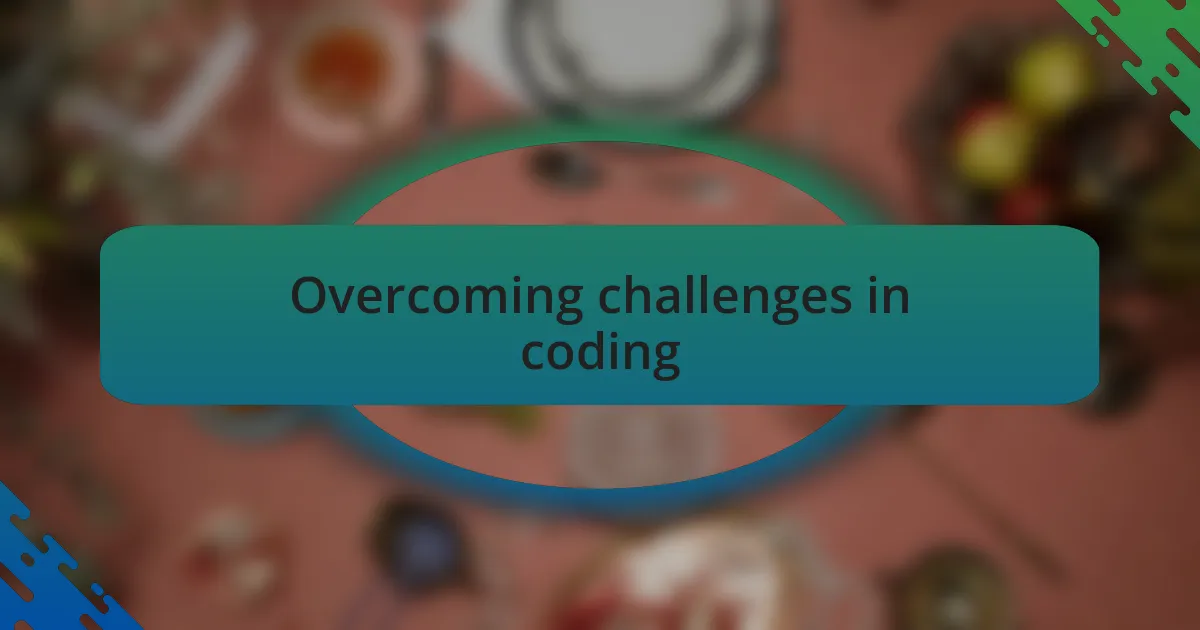
Overcoming challenges in coding
Overcoming challenges in coding can often feel like navigating through a dense forest. I recall a moment during a competition when I faced an intricate dynamic programming problem that seemed impossible. Just when I was about to throw in the towel, I took a deep breath, broke the problem down into smaller parts, and suddenly, the solution started to materialize. Have you ever experienced that moment when clarity breaks through confusion?
Another challenge I encountered involved a particularly stubborn bug in my code that I spent hours trying to fix. The frustration was palpable; I felt like I was chasing my own tail. It took stepping away from my screen and clearing my mind for a bit for the solution to hit me—sometimes, stepping back is the most powerful tool in overcoming coding hurdles. Do you value taking breaks when faced with a seemingly insurmountable problem?
One particular coding challenge that shook me was when I misjudged my understanding of a topic during a contest. I found myself scrambling to relearn concepts in real-time, battling nerves and self-doubt. Ultimately, it was a humbling lesson in the importance of preparation and self-awareness, reminding me that even as I gain experience, there’s always more to learn. That experience taught me that embracing vulnerability can be a path to stronger skills—have you felt that way too, recognizing your limits as a space for growth?
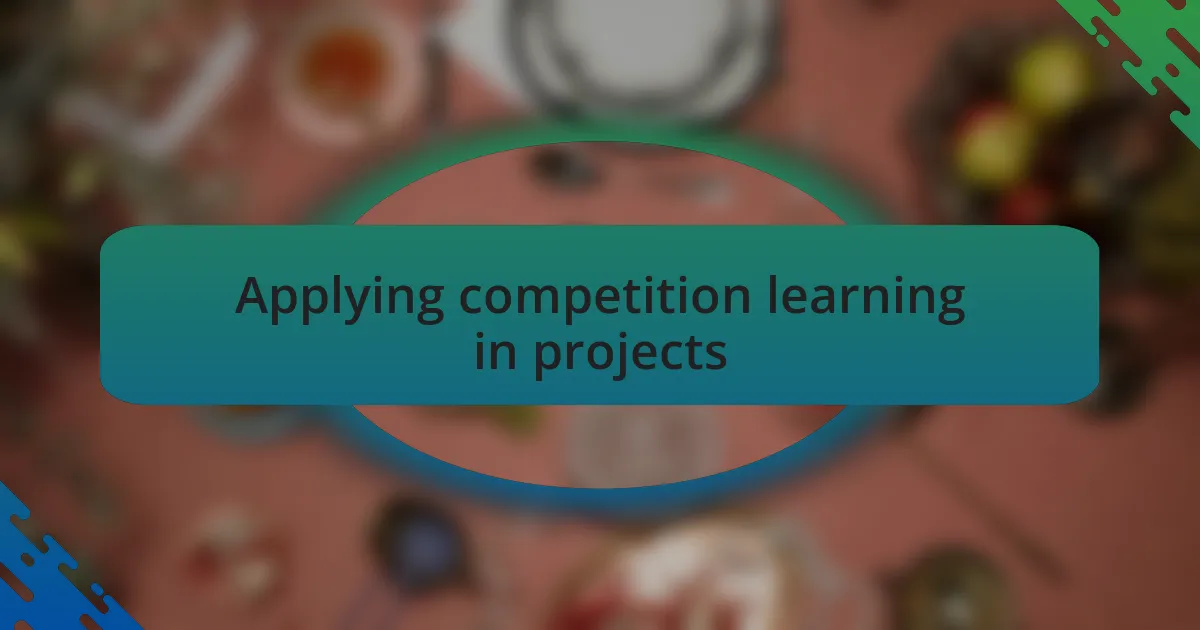
Applying competition learning in projects
In my projects, I often draw from the quick decision-making skills I’ve honed during competitions. There was a time when my team faced a tight deadline on a key feature, and I recalled how I had to think on my feet during a coding contest. This experience taught me to trust my instincts—it pushed me to implement a solution swiftly, even if it wasn’t perfect, knowing I could refine it later. Have you ever felt that rush of adrenaline prompting you to act decisively?
Additionally, competitions have instilled in me a deep appreciation for collaboration. During a team event, I learned the importance of leveraging each member’s strengths. I remember how one teammate excelled at algorithms while another handled data structures with ease. This balance not only enriched our overall output but also reinforced the idea that diverse perspectives lead to more robust solutions. Have you experienced the power of teamwork in your own projects?
Finally, I often implement the iterative learning approach I cultivated during competitions. There was a project where we initially launched a feature that didn’t resonate with our users. Instead of being discouraged, I remembered how in contests, feedback is immediate and crucial. We gathered user insights, made necessary adjustments, and within weeks, we saw significant improvement. It’s a reminder that failure isn’t the end—it’s merely the beginning of a better solution. How do you embrace feedback in your development process?